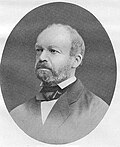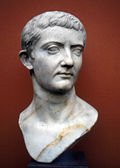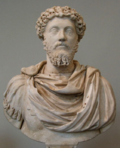Classical Latin
Classical Latin is the form of the Latin language used by the ancient Roman Republic and Roman Empire. It is distinguished from Vulgar Latin, which is the colloquial form spoken during the same time and later compiled into the Romance languages. Classical Latin was used in literature, official and scholarly works from around the 1st century BC to the 2nd century AD. This period is marked by the writings of Cicero, Virgil, Ovid, and Livy, among others, whose works have significantly influenced the development of Western culture and languages.
History[edit]
Classical Latin evolved from the Old Latin (or Prisca Latinitas) stages, which were recorded from the 5th century BC. The transition to Classical Latin is marked by the refinement of the language's grammar and vocabulary, largely influenced by the works of early Latin authors and the adoption of Greek stylistic features. The language flourished during the Golden Age of Latin Literature (circa 75 BC – AD 14), under the rule of Augustus.
Following the Classical period, Latin transitioned into Late Latin by the 3rd century AD, reflecting changes in pronunciation and the influence of local languages on the Roman provinces. Despite these changes, Classical Latin remained the language of learning and administration throughout the Middle Ages, until it gradually evolved into the modern Romance languages.
Grammar[edit]
Classical Latin grammar is highly inflected, indicating the relationship between words in a sentence largely through endings rather than word order. It consists of five main parts: nouns, pronouns, verbs, adjectives, and adverbs. Each noun is categorized into one of five declensions, which are groups of nouns with similar endings, and verbs are divided into four conjugations, each with its own set of endings for mood, tense, voice, person, and number.
Literature[edit]
The literature of Classical Latin is vast and varied, encompassing a wide range of genres including epic poetry, lyric poetry, tragedy, comedy, historiography, and oratory. The works of authors such as Cicero, Virgil, Horace, and Ovid not only exemplify the language's aesthetic qualities but also provide insight into the social, political, and philosophical ideas of their time.
Influence[edit]
The influence of Classical Latin extends beyond the realm of literature and language. It has been a foundational element in the development of Western philosophy, science, and law. Many terms used in modern English and other languages have their roots in Classical Latin, especially in the fields of medicine, biology, and law. Furthermore, the study of Classical Latin plays a crucial role in understanding the history, culture, and literature of ancient Rome.
See Also[edit]
-
Classical Latin
-
Classical Latin
-
Classical Latin
-
Classical Latin
-
Classical Latin
-
Classical Latin
-
Classical Latin
-
Classical Latin
-
Classical Latin
-
Classical Latin
-
Classical Latin
Ad. Transform your life with W8MD's Budget GLP-1 injections from $75


W8MD offers a medical weight loss program to lose weight in Philadelphia. Our physician-supervised medical weight loss provides:
- Weight loss injections in NYC (generic and brand names):
- Zepbound / Mounjaro, Wegovy / Ozempic, Saxenda
- Most insurances accepted or discounted self-pay rates. We will obtain insurance prior authorizations if needed.
- Generic GLP1 weight loss injections from $75 for the starting dose.
- Also offer prescription weight loss medications including Phentermine, Qsymia, Diethylpropion, Contrave etc.
NYC weight loss doctor appointmentsNYC weight loss doctor appointments
Start your NYC weight loss journey today at our NYC medical weight loss and Philadelphia medical weight loss clinics.
- Call 718-946-5500 to lose weight in NYC or for medical weight loss in Philadelphia 215-676-2334.
- Tags:NYC medical weight loss, Philadelphia lose weight Zepbound NYC, Budget GLP1 weight loss injections, Wegovy Philadelphia, Wegovy NYC, Philadelphia medical weight loss, Brookly weight loss and Wegovy NYC
|
WikiMD's Wellness Encyclopedia |
| Let Food Be Thy Medicine Medicine Thy Food - Hippocrates |
Medical Disclaimer: WikiMD is not a substitute for professional medical advice. The information on WikiMD is provided as an information resource only, may be incorrect, outdated or misleading, and is not to be used or relied on for any diagnostic or treatment purposes. Please consult your health care provider before making any healthcare decisions or for guidance about a specific medical condition. WikiMD expressly disclaims responsibility, and shall have no liability, for any damages, loss, injury, or liability whatsoever suffered as a result of your reliance on the information contained in this site. By visiting this site you agree to the foregoing terms and conditions, which may from time to time be changed or supplemented by WikiMD. If you do not agree to the foregoing terms and conditions, you should not enter or use this site. See full disclaimer.
Credits:Most images are courtesy of Wikimedia commons, and templates, categories Wikipedia, licensed under CC BY SA or similar.
Translate this page: - East Asian
中文,
日本,
한국어,
South Asian
हिन्दी,
தமிழ்,
తెలుగు,
Urdu,
ಕನ್ನಡ,
Southeast Asian
Indonesian,
Vietnamese,
Thai,
မြန်မာဘာသာ,
বাংলা
European
español,
Deutsch,
français,
Greek,
português do Brasil,
polski,
română,
русский,
Nederlands,
norsk,
svenska,
suomi,
Italian
Middle Eastern & African
عربى,
Turkish,
Persian,
Hebrew,
Afrikaans,
isiZulu,
Kiswahili,
Other
Bulgarian,
Hungarian,
Czech,
Swedish,
മലയാളം,
मराठी,
ਪੰਜਾਬੀ,
ગુજરાતી,
Portuguese,
Ukrainian











